DAMIEN'S STORY: ART AND CYSTIC FIBROSIS
By Helene Brophy
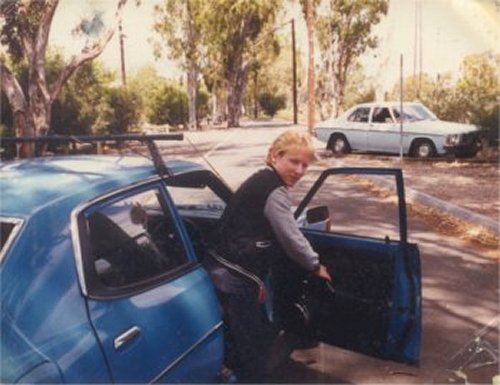
[Above] Damien age 18 with first car (Photo by Helene Brophy, 1981)
"... "Row-mi-ohhh, Row-mi-ohhh, whereforethefuckartthou"..."
My son, Damien Thomas Brophy, born 21st September 1963. We were rehearsing the play Romeo and Juliet for his next exam. Sharing the same study, Damien was doing year 10 English and I was trying to get on with some post-grad work. We were sharing the same room because Damien was studying correspondence, as he was, once again ill, being born with Cystic Fibrosis. He was at the time 14 or 15 and had had a hard time at both primary and high school and was both fractious and difficult to deal with. He had lost a great deal of time at both schools, falling behind. The fact that, out of frustration, he had put a brick through a window at high school from his wheelchair, had something to do with me trying out the correspondence idea with a part time La-Trobe student to coach him.
Although he was often ill, I tried to keep him interested in studying but two redheads in a small room together seemed to others somewhat masochistic. I conclude on that incident by saying that we read the play over and over and his paper mark came back with a B+ - and I tried never to involve myself in reading plays with him again. His self-learned ockerisms were hilariously funny but very distracting. It was a language not at all familiar to me.
A short history of Cystic Fibrosis is needed here, as many people will be saying, "what's that". Damien was the third of eight pregnancies, four of whom lived from 32 years of age (Damien) to three who lived from 10 months to one hour (Christine, Caitlin and Josh all of whom died from this potentially terminal disease which clogs all mucus glands and affecting the lungs, causing the loss of elasticity and eventually becoming very holed leading to the loss of blood oxygen and creating a serious cough and wheeze. The pancreas does not secrete the right digestive enzymes causing malnutrition, affecting the bowel. Three of the babies were late term losses, including a blighted ovum. Sharon-Lee, at 41 years, survives and has two children, 18 and 9.
This is a very over-simplified version of an insidious, ghastly condition, when to struggle to breathe is often an every day and every night event. The constant fear of a killer attack of asthma worsens the fear of being unable to work and stay out of hospital. Being admitted brought its own problems; all people with this disease know that various staffs lurk, most often in the so-called Cystic Fibrosis ward, (when there was one, it was closed due to lack of funding). Another fear was that any bug or germ could pass through the whole of a Cystic Fibrosis peer group. I was continually amazed to find, either at the Kids Hospital or the Alfred Hospital in Melbourne, that the kids could all be jumping around, happy and sociable, on any one day, or all would be downcast, coughing, oxygen or fluid lines in or out, on any other day.
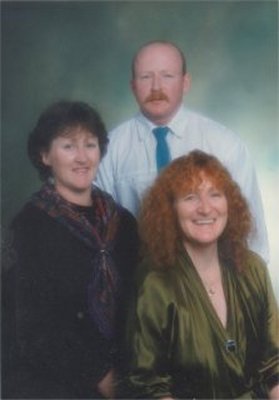
|
On a number of occasions I had to fly from Sale to Essendon airport, hire a car, fight the traffic, before finding out Damien's condition and if he was isolated. My students often bought me a bunch of flowers to present to Damien, which always made him cry. The hardest question I ever had to ask him was whether he felt that he could fight off the prevailing germs but because he did manage to fight those bugs off so many times, when the time came when he couldn't, I almost missed the fact that he was so ill.
As I have tried to show here, our lives were chaotic. The kid's father had been killed in a car accident many years previously, which I don't often remember to talk or write about as I just had to get on with living, protecting my children, working, studying, visiting hospitals and writing - whatever else I did I had to keep writing. I always kept a journal, more to do with future papers or notes for works in progress. Looking at those journals now, not much was written about Damien in particular. I wrote, it seems now, about almost anything and everyone but Damien. |
[Above] Family on Mother's Day: Helene, Sharon, Damien. (Unknown Studio, 1995)
In 1989 I thought that, as Damien had appeared to withdraw somewhat, that I would approach him and ask him to consider writing a book with me. Communication between his sister, Sharon, Damien, and I was deteriorating although he did spend quite a lot of time with his nephews. I only managed to get him to agree by couching the request in terms of "clearing the air between us all". To our amazement he agreed and so we began, but if I did not remind him, he'd say, at any given time "what book?" That book was never completed and became the skeleton of another of my works in progress and is still no closer to completion after the seven years since Damien died.
So much for the paperless office! The book Damien and I began has had many lives and many folders, but I obviously found it much easier to keep writing, about anything at all, than to write about Damien. Three weeks after his death I wrote a poetry suite for him and was surprised when my publisher, with no changes to my work, published them in a Multicultural Magazine and to my horror discovered that I had not written anything on his music, which was his life. That piece was also published in the next Multicultural Magazine and many other places as well. When Damien was alive I wrote to pretend he was not ill. His sister and I were not allowed to talk to anyone about his illness as he had made a habit of not talking about it himself. The second reason that that book was never completed? I began to write as though he were not dead!
There were, during all this, many good times for Damien and I. Although I owned a large library, Damien only picked up three books in his life: Kubler Ross," On Death and Dying", Carl Jung. The Theory of Psychoanalysis" and the last was a John Pilger. He would spasmodically phone me at the farm to tell me that there was a Blues program on television, or yell at me into the next bedroom in Melbourne, that there was a doco on such and such coming on the TV. I began to leave books around, for instance, on his bed. He quite got to like Charles Bukowski, so we went to see BarFly, an arthouse movie written by Bukowski himself, of course. It seemed at this time that Damien had found out that some arthouse movies were better than the violent videos he often watched and we (as often as I could convince him) went to see literary true stories, depictions of the Vietnam war, which explained why he'd gone to jail with me when a baby. The more 'truth' he read or watched, the more he wanted to understand life as it really was to compare it to what he saw as the 'untruthful now'.
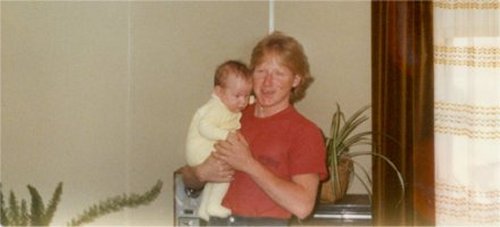
[Above] At 21 with first nephew Richard 5 months of age (Photo by Helene Brophy, 1984)
I discovered later that he then thought that his friends needed educating, so took them to see an "Arthouse". I must admit, though, that the Blues Brothers were too much for me at the Valhalla Theatre on a Saturday night. He did look good in his hat and dark glasses, dancing the well-choreographed shenanigans on stage in front of the movie.
The life span of people with Cystic Fibrosis has extended over the years since my first child was born in 1962, with the improvement of drugs and much research and more medicos interested in this aspect of paediatrics, and the treatment of parents has come a long way too. The latter idea I have been pursuing in a book since Damien died. Of course, patient confidentiality was the primary reason for parents not being told much after one's child turned 18 years of age, causing almost irreconcilable differences between parent and child or children. It is about this time of a parent's life with a child that the direction of all lives must change, even one with Cystic Fibrosis.
Damien was short, less than five feet. He never appeared to look his chronological age, two features of the disease which would keep him clinically depressed all his life. The most worrying feature for Damien and, I guess, for all others with the condition, was not knowing the extent of a life-span while relating specifically to how the individual themselves looked after their health, cultivated ambitions while trying to find their creative side, allowing them to live life to the fullest.
After completing my own academic work, it came time to leave my son to his tutor and choose my own direction. I decided that, with an inheritance, I would travel overseas and check out American women's issues, which I hoped would give me enhanced experience to follow that academic track when I returned. I talked to Damien's consultant, then at the Kid's hospital in Melbourne, and he thought that Damien's health was O.K. And so I left, for Ireland, America and Europe, Women's Studies courses at various universities, volunteering in refuges, drug and alcohol residences and community assistance houses for women and other NGO's.
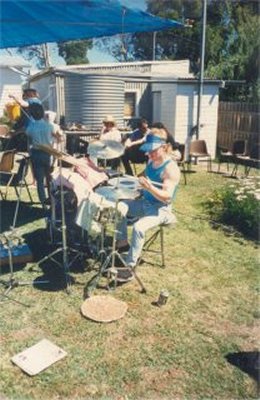
|
Our family is Irish on one side and Italian on the other but I now know the Irish is dominant, as I often had to remind Damien when I had to endure his racist Irish jokes (which were very funny). After hitching most places around the world at the age of about 39 with a guitar and a backpack I returned to Australia after about 4 months.
I found that not much had changed. Both Sharon and Damien appeared not to have missed me too much, but Damien had decided to teach himself to drive in my large Fairlane, making chalk marks to put the car back where it had been. My only concern about all this was that I knew he was too small to see over the steering wheel but with a straight face I was rather proud of his initiative.
Having just about decided upon my own next career move I turned unwanted attention to discussions about what might be Damien's decision about his future. Definitely a wrong move! Over the years I had noticed Damien drumming on things, a glass, the table, somebody's head and I found it annoying until I realised that because he was exposed to my music, he might make a drummer so I bought him a set of 1950's Yamaha drums and he began lessons. He became an excellent musician, formed a number of bands, but the drug scene he found hard to handle in more ways than one. |
[Above] Playing drums with his mother's band, Jigalong (Photo by Helene Brophy, 1984)
Damien became a serious musician, while still working three shifts, morning, afternoon, and night. As most young musos do, he played hard and long, suffering awful consequences but picked himself up and carried on. I loved to be asked to grab my instruments and join his band in the studio, either just to fiddle in the background or cover for someone who'd not turned up.
I wrote poetry for both of the kids when they were little and Damien loved to see me illustrate, copying me and sometimes inserting his own drawings, which were published.
At this time I was life modelling for a number of art schools but mostly my own Art Society. Damien accompanied me many times and I have a charcoal Triptych of myself in three-minute sketches of which I am very proud. He showed great promise but at 30 years of age he did not recognise his own work. He'd forgotten it. I had to show him his signature.
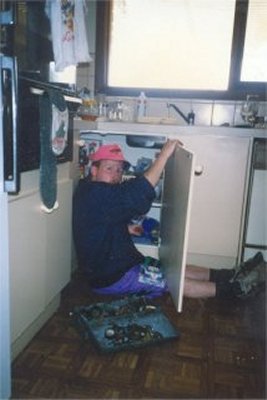
|
I also wrote poetry books for both of my daughter's kids each birthday; not so much now as Harry Potter seems to have supplanted me. Damien included the kids in his music but was often impatient with them when he was ill; both of his nephews adored him. He bought them expensive presents, took them to fatty food outlets, gave them money and told them off.
The last band in which he played was the one going places but all members remained unaware that Damien was so ill, so much so, that he couldn't pick up the drumsticks when band members were visiting him that day before he was hospitalised for the last time. Then, I knew, that his life was almost over and that the previous three months of struggle had exhausted him.
I had, as has been said, gone back to work after writing Women's Studies courses which I taught at regional community houses and, for some reason now forgotten, Damien was admitted to a rehabilitation clinic and Sharon moved out of home with her partner.
I moved to Warburton and travelled around the outer-eastern area teaching and consulting. So often, neither of my kids knew exactly where I might have been.
|
[Above] Damien 'Fixit' (unknown photographer, 1994)
Through various means I found myself with a small grant to begin a Women's Programme in Gippsland, at, of all places, an Agricultural College, which was then sponsored by TAFE and I was nurtured by great colleagues to travel all over Gippsland as well as Far East Gippsland.
I offered a number of courses from an advanced Communication course in which I included a Personal Development Unit. I was horrified to discover that after forming 17 groups of 25 students to each group, that all had chosen Personal Development. When these groups bonded I closed further applications to each. I did have a little trouble with student's partners, especially when all some of the students wanted was to gain courage enough to say they no longer wanted to be shearer's cooks.
On being in Melbourne for conferences I attempted to see my kids. Sharon, by now, with a tiny baby, and Damien doing awful jobs, before deciding to join what was then the railways. as a special class signal person. This prevented him from mixing with the public and exposing him self to bugs which would affect his lungs. He still often found himself hospitalised having developed a pneumonia, but remained in that job for 16 years, living in a flat or with his sister until eventually, as a second choice, he lived with me for the last two years of his life. For many years, his bosses did not know he was ill, until he collapsed at work. The band members (Time's Child) knew nothing of Damien's illness and bonded with Damien as their drummer. It was a shame that he deprived them of knowing that only his music was keeping him alive.
By way of conclusion, and having talked about Damien's illness, I must say that Damien often told us that his drums and music were better than having sex. We used to tease him about the fact that he played the drums so much he didn't have time for sex, but he did tell me some stories about his first visits to parlours, so his art was connected to his life's feelings and experiences. What did Damien's life mean to his friends, family, and peer group or to the world? What did his life mean to him? Talking to these groups, I discovered that life to Damien meant music, meaning, playing the drums in a band. 'Time's Child' took three years after Damien died to replace him.To see him on video, playing in the studio cutting CDs' is like watching a man who only showed his 'truth' through the drumsticks. He showed confidence, love, peace and fitness, at which he worked hard, lifting weights. He never looked ill behind his kit. The band members say he gave them, and people at all their gigs, pleasure and skill.
I believe that Damien remained alive to live his music and be with the band. It mattered to him that he reached his musical potential and when he achieved what he set out to do he was too tired to go on living.
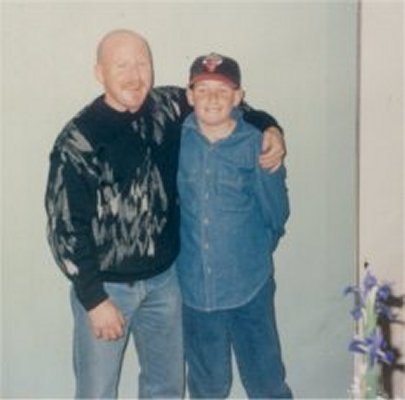
[Above] Last year of life with Richard (12 years of age) (Photo by Helene Brophy, 1995)
My own music surrounded my life and work. When I organised Women's Festivals I made sure there was a performance night. There were many musicians, singers and players amongst my students. Others performed circus acts and recited their own poetry and sang original songs. I sometimes sang folk songs and played guitar, but I always played Irish fiddle and the dance went on ...
With a College car, I took my courses all over Victoria and Australia. Queensland Women managed to get some funding to buy a van and travel outback to isolated women on farms. I travelled to present papers on my work and made the programme available to those lecturers and teachers who were interested. I worked six days a week. Motels and pubs became my home for these six days. On Saturdays I put on my ski gear with the skis on top of the car, taught at Swifts Creek, drove to Mt. Hotham and skied all of Sunday, driving home to Maffra to sleep the only night at home and began again on Monday. Why?
I had made work with women my life. I had been part of the second wave of feminism and I did not know when I took up the grant that I would meet only one feminist in a very conservative area. This period of my life became one of the most constructive, positive and happy working times of my life. I know that I was not always popular, but that was not my concern. My drive was related to making further education available to as many women as possible. Which was achieved beyond belief.
When my kids were old enough to understand we discussed the fact that there were only three of us in this family, and we were responsible for each other. I insisted that Damien learn not to take crap from anyone who including his sister and mother. Sharon and I believe that we don't know anyone who took anything so literally. We also discussed each other's freedom of speech and behaviour, including mine. I explained that, at the end of my life, I did not want to be bitter about not having done what I wanted to do. Of course, this meant that I was not going to prevent my kids, especially Damien, whom I refused to (s)mother, from attempting anything. He held this against me, and his sister became a surrogate mother, to whom Damien became abusive; she was available, I was not. He forgot the deal, but pulled up when he knew he'd gone too far, usually with a present for either his sister or her kids.
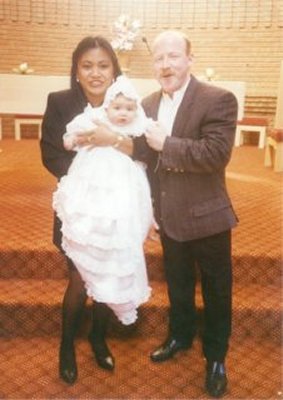
|
As my kids were growing up, it became the norm for the Art Society members to convene at our 45 square house, and not too many of us were well the next day. These evenings gave the kids the opportunity to meet writers, painters, lawyers, doctors, poets and any other interesting people within the Society. Damien and Sharon learned that professionals were normal. I had spent many years chasing degrees. Social equality was never an issue. When I was away any one of these friends took on the surrogate role, some with no children and no experience with kids.
It must be said that none of us had much money in those heady days of feminism, socialism, art, music and living. Going to jail for demonstrating outside Pentridge jail in Melbourne against the hanging of Ronald Ryan was not too much fun, especially when being pulled out of a tree with Damien in a sling on my chest. It was certainly a curious way to see the under-belly of a horse. I used to joke that Sharon and Damien were as much jailbirds as their mother. Marching behind Jim Cairns against the Vietnam war, lying in front of trams, tractors and bulldozers became par for the course for my kids and I had to be a bit sneaky about what I told them when we piled into the car. All of this taught Damien well. He hell-raised at union meetings or at many other organisational meetings, often winning his points. |
[Above] Spiritual Father, Fern Tree Gully (photographer unknown, 1995)
I learned from Damien (or did he learn from me?) that strength can and does keep us alive. Had he had no music, his art, he could have died much earlier. He needed no reassurance that he was the best at what he did. I know, as his mother, that he knew better than any of us that he had to keep himself alive, that none of us could do it for him. That also meant being so competitive that unless people knew they saw it only as arrogance. He was arrogant, with good reason from his mother's perspective. He had to be the best snooker player, and he was, so railway tournament opponents tell me.
He was a good tennis player, I know, I taught him and never beat that left hand again. I taught him to ski, I never caught him again. I taught him to read music and envied his rhythm but was proud of his mind-strength.
People with Cystic Fibrosis mature quite late, and those of his peers with the disease were in many ways creative. Some were multi-skilled in professional ways, such as my brother-in-law who was a cabinet maker, an orthotics maker, and musician. One girl was an excellent photographer, another a framer and painter. All these people had effects on each other and certainly on those around them who were well. My role?
All parents are different. My partner and the children's father drank too much due to our losses and I remained alone by choice so that Damien could grow, thrive and achieve, after their father was killed. My kids wanted no substitute for their father and, although I did have a long-term relationship, it did not last when discipline became a real issue. My role as single mother was to watch, encourage both of my children and support Sharon when she was not aware of how ill Damien could become when he was living with her. She was just too close, as his surrogate parent.
Damien did not suffer fools gladly and could work a whole shift without uttering one word to any guy who talked "bull-shit", lied or talked themselves up, when to him, they were incompetent. He rarely wasted precious breath on nothings, as he long ago realised that his time and life were limited. Damien waited for me on Sunday 26th November 1995, to come from the farm to the unit to take him to hospital. Many of his friends had called at the unit and offered to take him, but we both realised that maybe this would be the last admission. Sharon arrived at the hospital some time later and, after some discussion, I decided that I would not leave Damien.
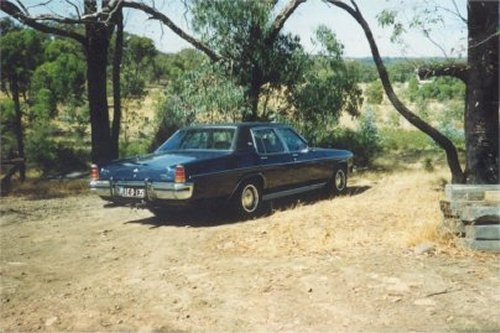
[Above] Second love (after drums) Statesman Caprice (1974) (Photo by Helene Brophy, 1995)
The night was unforgettable. Damien looked for cool spots on the hospital floor, carrying his bed sheet. Sharon and I went to make a coffee and stepped over a bundle of sheets near the nurse's station. When walking past the bundle again, I was shocked to see Damien's trendily bald head. There are no words to explain our feelings. Damien had not wanted us to stay, and so we could make no noise, by waking him. Sharon left the hospital to get her kids to school the next day, Monday. I had dropped my mobile phone, which the social work department had couriered to the manufacturers. I was not available to take any calls from Sharon, when she turned around to return to the hospital.
Damien was restless and struggling for breath. I tried to get him to slow his attempts and held him. I suggested to him that he had a lot to live for. He was about to collect a large disability payout, buy a four-wheel drive and travel with the band to Ullaroo to cut a peace and meditation disc. His response was: he was too tired, too ill and had lost all motivation to go on. I helped him get into bed and left to get yet another coffee.
There was a 'blue alert' but I didn't hear it. The social worker did, while handing me the coffee. "There's an emergency in ward 5, and I think it's Damien." She took my hand as we almost ran to the lift. On getting to the ward Damien was being attended by Intensive Care Staff. He had suffered a pulmonary arrest and was unconscious after being given a drug. Sharon learned of her brother's collapse from the telephonist on her way back to Damien. I stayed at the hospital all week, and when Sharon was able to stay, we found a specialist's suite with a loo and wash basin, and took our blankets given to us by the ICU Staff and slept there.
We slept little and wandered in and out of ICU to massage his legs and arms, put moisturiser where it was needed, watched monitors, played music through his earphones and kept talking to him, talking to him, talking to him ... Much happened through Damien's last week, which cannot be covered here. We allowed Damien to go, at exactly 6pm on Friday the 1st of December 1995.
About the Writer Helene Brophy
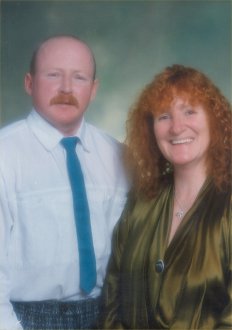
|
Helene Brophy became a writer and poet at the age of 12 as a lonely boarding school girl and was published in English children's short story magazines. She became a street poet also at a very young age and began to be published in newspapers and small literary magazines. Canberra Parents' Involvement With Girl's Education was published by the Victorian Education Department 1983. After writing Women's Studies Courses she taught those courses for many years which included a Communications Skills component for women only. Being a musician and journalist herself allowed her to do most of the PR work involved in nurturing women in writing and music and biography writing at University, TAFE at a Community level. Brophy's works have been read at Melbourne Town Hall, Harold Park Pub in Sydney, The Women's Shelter, New Orleans USA, Women's Drug and Alcohol Rehab. The Bronx, USA, Literary Conferences in Adelaide, Melbourne, Perth, Brisbane, Sydney and Darwin. Among Brophy's many works in progress include Time's Child: The Skins Of A Rhythm Man. At 62, Helene Brophy has remained a writer. |
[Above] Mother and son, Helene and Damien Brophy, Mothers Day by unknown studio photographer, 1995.
I Next I
Back I
Exit I
Thylazine No.6 (September, 2002) |



